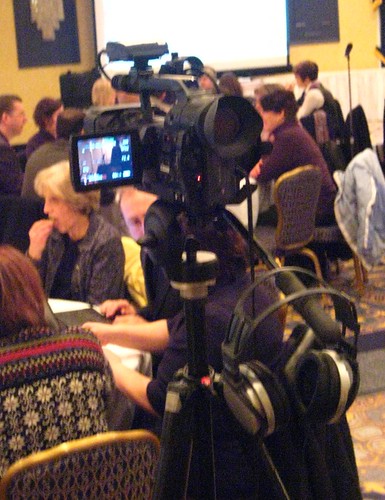 |
|
|
Most of this was written during my flight home from Edmonton on Tuesday. I had spent Monday in Edmonton, Alberta, working with about 250 educators from the local school district, some neighboring districts, and the local Catholic schools (also publicly funded in Alberta). Similar to many of the districts I’ve worked with lately, the Edmonton Public Schools have been focused on improving student performance, as measured by the province — for which Edmonton has been especially successful. But they are now looking to the future, realizing that much has changed in recent years, for which their schools have not kept up.
I started off with a general keynote address talking about the future, our students, and how the nature of information has changed, becoming increasingly networked, digital, and abundant. That address was watched, via teleconferencing, by several students from each of five high schools across the district. These students backchanneled the address using Knitter, the transcript of which was immediately made available to the educators in the immediate audience. They used this transcribe and their own reactions to fuel small group reflections and conversations.
One of the continuing themes of the students’ conversation was the digital divide and a learning divide. Another was education in general, about which they were fairly conservative in their opinions.
Here are some quotes from the studentss chat:
I do not want to just learn facts, I want to learn why things are said and done the way they are.
..education cant change the only thing that changes is the way its delivered
I say we make Windows and Mac open-sourced. Send the development code to tech instructors at public school boards. See what happens 🙂
As part of a conversation about Wikipedia and the library:
there’s no reason to go with one or the other, but it IS necessary to know how to use both
To the question, “…isn’t technology making us lazier?”
Theres a fine line between lazy and the ability to do more, if the computer can check our spelling, that saves us time to do more
i believe that technology has made the poputaion lazy. but it can also be veiwed as a very positive thing if we learn to use it in a way that is positive for society.
About Facebook:
Facebook may not be completely safe but neither is taking public transport that doesn’t stop us from using it
Random thoughts:
y not cut down on the keeping up and focus on whats important, student learning, there’s always going to be the latest and greatest technological advancement…
Sitting and watching powerpoints for an hour everyday is not as exciting as it may seem
computers are used like typewriters, everything useful is blocked or restricted
why not make the students the teachers..

I have to agree that watching powerpoints just doesn’t do it. I’ll see them, hear about what I’m supposed to learn and then forget all within an hour.
I did not know Clarence Fisher thanks for making me discover him